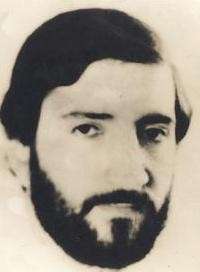`Adnan `Uqla
| ʿAdnan ʿUqla عدنان عقلة | |
|---|---|
 Uqla, sometime in the late 1970's | |
| Leader of the Fighting Vanguard | |
|
In office c. 1980 – April 1982 | |
| Preceded by | Husni 'Abo |
| Personal details | |
| Born |
1950 Quneitra, Syria |
| Religion | Sunni Islam |
| Military service | |
| Commands | Fighting Vanguard |
| Battles/wars | |
ʿAdnan ʿUqla (Arabic: عدنان عقلة) was the leader of the Fighting Vanguard; a Sunni militant group connected to the Muslim Brotherhood that participated in the failed Islamist uprising in Syria. He was noted as being particularly zealous, and of being the Vanguard's most charismatic and influential figure.[1]
Early life & education
Uqla, the son of a baker, was born into a middle-class family in Quneitra[2] in 1950.[3][4] Uqla studied civil engineering, and also served in the Syrian Army as an officer.[3]
Islamic uprising in Syria
Uqla played a key role in the planning of the Aleppo Artillery School massacre in 1979.[2]
Uqla declared the independence of the Fighting Vanguard from the Muslim Brotherhood in January 1981, and claimed that he was continuing the fight against the Syrian government for the sake of god.[5]
Uqla arrived in Hama anticipating the beginning of a general uprising against the Syrian government.[5]
Despite having broken with the Muslim Brotherhood, Uqla was only officially dismissed from his position as leader of the Fighting Vanguard in April 1982, following the Hama Massacre.[3] Many leaders of the political wing of the Muslim Brotherhood fled to Iraq, and although the Iraqi government welcomed the political leaders, it refused to provide refuge to leaders of the Fighting Vanguard. According to some reports Uqla was arrested when trying to sneak back into Syria in 1983 or 1984, after being refused refuge in Iraq.[4] Other sources cite him as being killed in 1982,[2] or being caught by Syrian security forces in late 1982.[1]
References
- 1 2 Raphaël Lefèvre (14 December 2012). "The Syrian Brotherhood's Armed Struggle". Carnegie Middle East Center. Retrieved 28 July 2013.
- 1 2 3 Seale, Patrick; McConville, Maureen (1988). Asad of Syria: The Struggle for the Middle East. University of California Press. p. 325. ISBN 9780520066670.
- 1 2 3 Dekmejian, R. Hrair (1996). Islam in Revolution: Fundamentalism in the Arab World. Syracuse University Press. p. 115. ISBN 0-8156-2635-5.
- 1 2 Embassy Damascus (26 February 1985). "The Syrian Muslim Brotherhood". WikiLeaks. WikiLeaks cable: 85DAMASCUS1314. Retrieved 29 July 2013.
- 1 2 Khatib, Line (2012). Islamic Revivalism in Syria: The Rise and Fall of Ba'thist Secularism. Routledge. ISBN 9781136661778.